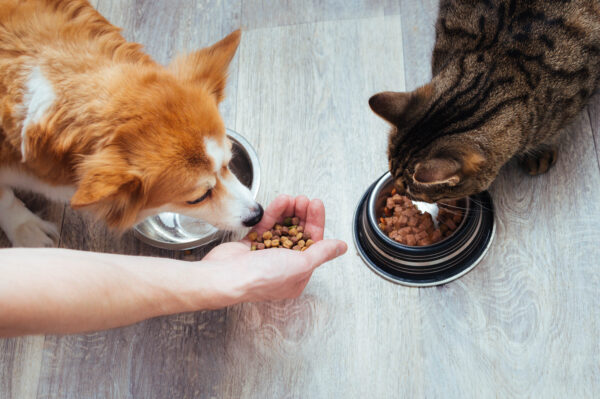Welcoming a puppy into your family is a life-changing event in more ways than one. Alongside unconditional love comes a huge commitment. Looking after a new puppy properly (ironically) isn’t a walk in the park – that’s why we’re here to help you with the important stuff so that you can spend more time getting to know your new playmate.
First thing’s first – what type of dog should I buy?
Dogs come in all shapes and sizes, so it can be difficult to decide which breed (or crossbreed!) is best for you. Take note of the characteristics your preferred breeds possess; some dogs are more difficult to train than others, some dogs are more vocal than others, and some dogs, such as border collies, require a vast amount of exercise compared to others. Consider your lifestyle; if you work 10-hour days and live an apartment then getting a highly active large dog may not be the best idea. Find out everything you can about the breeds you particularly love, so you can make the best choice for you and your family.
How will I know if the breeder is responsible?
Now that you’ve decided which breed is right for you, you can move on to the second item on your checklist – where to buy a dog. If you’ve decided that you’re going to be buying a puppy from a breeder, you should ensure that the puppy is healthy, happy and from a reputable source.
A responsible breeder will:
- Spend time talking to you on the phone and will arrange a time for you to meet the puppies, their mum and littermates, in the place where they were born and raised.
- Be happy to have more than one meeting to ensure you and the puppy that you’re interested in are compatible.
- Be happy to answer all of your questions and ask you just as many to make sure that their puppies are going to a good home.
- Be happy to use the Puppy Contract.
- Be happy to show you their Local Authority license if they are breeding and selling pets as a business.
- Provide genuine paperwork/certificates for puppy vaccinations, microchipping, worming as well as any results for health tests where relevant.
If the breeder you’re looking to buy a puppy from hits all of the above criteria, there is a chance that they’ll have a puppy waiting list. A healthy, happy puppy is always worth the wait.
If you’re struggling to find a responsible breeder, there are hundreds of young puppies for adoption at rescue centres that could make a wonderful pet for you. A rescue centre will also have taken care of the essentials such as parasite cover, health checks etc.
Do I need to meet the puppy’s parents?
Yes – this is an extremely important part of buying a puppy. Ask to see the puppy with the mother and (where possible) the father. If the breeder used a stud or the male doesn’t live with the breeder, ask to see paperwork relating to him.
The breeder should be happy to provide information about both parents, so make sure to ask plenty of questions, such as:
- How old are the parents and what age did the mother have her first litter?
- Have they both been used for breeding before? If so, how many litters have they had (either between them or individually?)
- How many pups were born out of each litter and were they all healthy?
- Did the mother require assistance whilst giving birth/did she have a caesarean?
- What is both of their behaviour/temperament like around adults? Children? Other dogs? Cats?
If you are looking to buy a dog whose breed is predisposed to a particular condition, make sure to ask the breeder if the parents have been tested for it.
What do I need to know before I buy the puppy?
- Is the puppy 8 weeks of age or older?
- See where puppies are being kept and where the mum gave birth (whelped).
- Were there any difficulties with the puppy you are looking at during birth? Were they any problems after? Were any hand reared?
- Make sure to see all puppies from the litter interacting with Mum and moving around freely, i.e. not just in a crate.
- Are the puppies all in good general health? Any sniffles/vomiting/diarrhoea etc?
- Find out how frequently they have been treated for fleas and worms and what with.
- Ask to see vaccination records and note the brand i.e. Nobivac DHP/L2 (or L4), Eurican etc.
- Check if they’re microchipped or ask when the breeder is planning to have this done – microchipping is now a legal requirement for all dogs over 8 weeks old.
- Make sure to ask what food they are currently being fed.
- Have they got any pet insurance at the moment? Some breeders have 4 weeks pet insurance for their puppies.
It’s home time! Am I good to go?
- Your puppy should come to you with all the relevant paperwork, including proof of vaccinations, flea and worming treatments, microchip details, insurance and your copy of the puppy contract (if this has been used).
- Your breeder or rehoming centre should be happy for you to have their phone number and contact them if you have any questions or problems.
- Make sure that your puppy is transported in a crate or with an appropriate car harness for the journey home.
How should I welcome my puppy into their new home?
Your new puppy may be a little bit anxious on arriving at their new home, as they will likely have not been away from their mother or siblings much. Consider having your puppy’s bed and training crate set up ready so they can have somewhere quiet to get used to their new home.
What training does my puppy need?
Young puppies are very receptive to new experiences between the ages of approximately 4 and 16 weeks. It is vital that they are well socialised during this period to get used to other dogs, adults and children (puppy training classes can be a good way to do this). Consider getting them used to certain loud noises such as traffic, the washing machine and the vacuum cleaner, as well as things they will encounter throughout their life such as the vets, people riding bicycles in the park etc. Putting in additional time and training during this crucial window can help them to develop into a well-rounded, confident individual when they mature. In addition to training classes whilst your puppy is young, training classes are something that they can continue to attend all the way through their early life to learn new skills, such as recall, and can be a great way to channel their energy.
What should I feed my puppy?
Your breeder or rehoming centre will likely have had your puppy on their preferred choice of dog food and may even have sent you home with a few days’ worth to get the ball rolling. If for any reason you decide that you want to change your puppy’s diet, make sure you do so gradually over the course of a couple of weeks to give your pup a chance to get used to the new food and minimise the risk of unwanted stomach upsets.
What toys will my puppy need?
Your puppy will be naturally curious and have lots of energy; make sure that they have a range of suitable dog toys for them to chew and play with. This will not only save your furniture (especially when they are teething), but will help you teach them that they mustn’t mouth or play bite on your hands or feet; as cute as this can be when they’re small, it’s not a habit that is desirable in a fully grown dog!
When should I first take my puppy to the vet?
Your puppy will likely have received their first vaccination injection whilst in the care of their breeder or rescue centre. When they require their second puppy jab, you will need to register them at your chosen veterinary practice. The visit to the vets is a good chance to get your puppy used to new sights, sounds and smells, so should be a positive experience for them. Your vet will give them a full health check and discuss their vaccination protocol with you based on what your puppy has already had. They will also discuss parasite prevention and future neutering, as well as how you are getting on with diet, training and generally looking after your puppy. They are an excellent source of information if you have any questions.
- Vaccinations – Puppies and adult dogs should be vaccinated against distemper, hepatitis, parvovirus, parainfluenza and Leptospirosis +/- kennel cough +/- rabies. The core vaccines are usually given around 8–10 weeks of age (although the most recent Leptospirosis vaccine has the second dose given at 12 weeks rather than 10). Most vets will advise you to wait a week after your puppy has received their second injection before going for walks in public and mixing with other dogs to allow their body to produce the required level of immunity against the diseases they’ve been vaccinated against. Your vet will also discuss what vaccination schedule your dog should be on as an adult.
- Worming – Generally, vets advise puppies are wormed once every two weeks until they are 3 months of age, and then once monthly until they reach 6 months of age. After this, the general advice is to worm your dog once every 3 months, but your vet can advise on an appropriate schedule for your dog based on its lifestyle. It is also important to remember that tapeworms can cause serious problems in children.
- Fleas & Ticks – Most dogs, depending on the product used, are treated against fleas every 4–8 weeks. Ticks are becoming more common in the UK, although we still see more concentrated episodes in certain locations. Prevention against both is important because, as well as being an irritation to your dogs, fleas and ticks can transmit other diseases.
- Health check – Your vet will conduct a thorough physical exam when they see your puppy for the first time to check their general health and also for any defects or conditions that could require treatment. Key things they will look at include their eyes, ears and mouth to check that their teeth and palate all look normal. They will listen to their heart and lungs, feel their stomach and check for any hernias. They will also check the range of motion through their hips for any signs of hip dysplasia. In male dogs, they will also check to see if their testicles have descended yet.
Should I get pet insurance for my puppy?
Sometimes, no matter how careful or rigorous you are with your dog’s health, accidents can happen, and our pets can become unwell. Consider how you would be able to cover the cost of unexpected vets’ bills should they arise or if your dog was to develop a long-term condition, such as diabetes, that would require medication for life. Pet insurance is now very commonplace and there should be a policy to suit everyone’s needs. A word of warning – when you are shopping around, make sure to read all the small print.
Our articles are not a replacement for face-to-face vet advice. It’s important to consult with your vet on a regular basis to raise any pet concerns that you may have.



